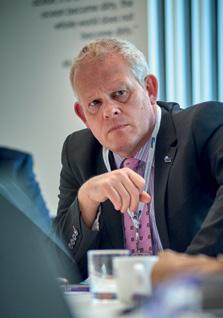
3 minute read
OUR WELL-BEING CAMPAIGN
To coincide with Tim Bowen’s presidency, and simply because it is needed more than ever, NAHT has launched a campaign to focus on the well-being and mental health of school leaders.

Tim said: “It’s no secret that school leaders do an incredibly stressful job, and no more so than over the pandemic, but while we often talk about these issues, we rarely focus on the things that can help.”
Tim has chosen Education Support as his nominated charity for the year, the only UK charity dedicated to supporting teachers and education staff’s mental health and well-being. Find out more about Education Support here: www.educationsupport.org.uk
SOME WAYS NAHT MEMBERS LOOK AFTER THEIR WELL-BEING
NAHT carried out a snapshot survey of members during the summer term to ask them the following: is there anything you’ve done during the pandemic that has been particularly helpful for your wellbeing or mental health? Here is a selection of what they said.
‘GOING FOR A RUN’
“Being outdoors; going for a run. Something I will hold on to forever is being able to finish work at a decent hour and spend some time with my young children (which I never got to do before the pandemic).”
‘WALKING THE DOG’
“Bought a dog! Walking the dog means that I have to get outside, and I have to do this every night ... rather than reach for the wine!
“[We’ve also implemented] a renewed emphasis on staff members’ well-being, including the training of two mental health first-aiders and a well-being strategy, which extends to governor level. All policies are reviewed in the light of work-life balance and well-being, which staff say has impacted them positively.”
JULIE WRIGHT, HEAD TEACHER
AT ALL SAINTS CHURCH OF ENGLAND PRIMARY SCHOOL, WIGSTON, LEICESTERSHIRE
‘WELL-BEING LUNCHES FOR STAFF’
“[We’ve put in place] counselling for pupils and counselling for staff, including ‘well-being’ special lunches for staff teams, split into each key stage.”
‘RUNNING, AND LISTENING TO AUDIOBOOKS’
“The most helpful thing that has happened in our area is that local secondary heads have met once a week via Zoom to exchange ideas, solutions but also, more importantly, to share stories, empathise with one another and laugh together. It has been like group therapy.
“I also have from the outset adopted a completely transparent approach with governors and the senior leadership team. Nothing is kept back, and we share responsibility for decision-making. We also said early on that we would forget the development plan and our strategic priorities and just focus on getting through the pandemic.
‘OUR SCHOOL’S THERAPY DOG’
“We got a new school therapy dog. It’s been lots of work, but it has brought joy and fun and a welcome positive distraction for pupils and staff.”
KATHRYN HARPER-QUINN, HEAD TEACHER AT HOUNSLOW HEATH INFANT AND NURSERY SCHOOL
“Finally, I knew I had to find a way to get some ‘headspace time’ that didn’t involve a glass of wine, so I took up running again and listening to audiobooks completely unrelated to work or the pandemic. Both have been extremely helpful, and as a bonus, I have lost weight!”
SEAN MAHER, HEAD TEACHER, RICHARD CHALLONER SCHOOL, KINGSTON-UPONTHAMES
‘ENCOURAGING STAFF TO LEAVE PROMPTLY’
“One of the first things I did was to move the staffroom into the hall. It sounds like such a small thing to do, but it glued my (already strong) staff team together.
“They sit in there for playtimes, have lunch there, and we have our staff meetings there. It has meant the staff have reacted well to the many changes, and they have been incredibly supportive, which has helped massively with the stress of dealing with the pandemic and has also hugely helped me.
“I have also (with the staff) looked at workload again. I have actively encouraged staff to leave promptly at the end of the day and reduced workload to support this. Tired staff create additional stress for me!
It’s also given me the green light to go home early and not create work (we head teachers are all prone to that!).
“I have reduced paperwork enormously over the last year. And the school has run very well without it – as a school, we have really tried to use this opportunity to take stock. Having a strong local network of heads has also helped: as the pandemic has become ‘normal’, it’s interesting to note that the frequency of emails has reduced!”







